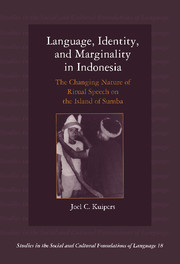 Language, Identity, and Marginality in Indonesia
Language, Identity, and Marginality in Indonesia Published online by Cambridge University Press: 05 July 2011
Scholarly literature on language “shift” and language “death” often makes these changes appear to be impersonal, structural processes. Of course, speakers are occasionally depicted as sad and angry or dismayed – retrospectively – about the loss of their language; but discussions about the role of emotion in the creation of the conditions of shift themselves are not so easily found. Language shift is not only a structural and pragmatic process, but it is one that is mediated by emotional attitudes and assumptions about the structure and use of language in a particular context. Emotions do not only enter in after the fact, but are part and parcel of the process of shift itself. As Kulick observed in Gapun, New Guinea, women's angry speeches (kroses) in the native language and men's more polite speeches in Tok Pisin were in effect competing ways of representing relations to the outside world: they are choosing the less “angry” and (for them) feminine way (1992a: 294). Similarly, for Mbora Kenda, converting to Christianity – and thus abandoning most forms of ritual speech – was a way of choosing “cunning” over “anger.”
But if emotions have played little role in the study of linguistic change, linguistics has also had a relatively small part in the study of emotional change. When the verbal aspects of emotion are given scholarly recognition, the focus is usually on explicit emotion terms and “hypercognized” (i.e. self-conscious and culturally elaborated) categories of emotional experience such as “shame” and “honor” (Abu-Lughod 1986), or “anger” (Rosaldo 1980; Levy 1984).
To save this book to your Kindle, first ensure [email protected] is added to your Approved Personal Document E-mail List under your Personal Document Settings on the Manage Your Content and Devices page of your Amazon account. Then enter the ‘name’ part of your Kindle email address below. Find out more about saving to your Kindle.
Note you can select to save to either the @free.kindle.com or @kindle.com variations. ‘@free.kindle.com’ emails are free but can only be saved to your device when it is connected to wi-fi. ‘@kindle.com’ emails can be delivered even when you are not connected to wi-fi, but note that service fees apply.
Find out more about the Kindle Personal Document Service.
To save content items to your account, please confirm that you agree to abide by our usage policies. If this is the first time you use this feature, you will be asked to authorise Cambridge Core to connect with your account. Find out more about saving content to Dropbox.
To save content items to your account, please confirm that you agree to abide by our usage policies. If this is the first time you use this feature, you will be asked to authorise Cambridge Core to connect with your account. Find out more about saving content to Google Drive.